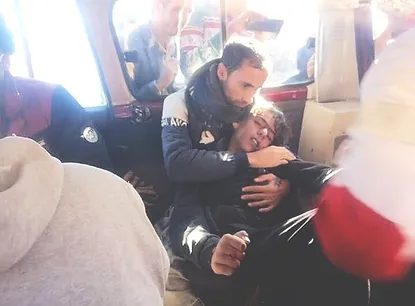Yeganeh Khoie
Could you still remember Ferhad Khosravi? It was 20 December 2019 when his frozen body was found at the heights of Kurdistan. Do you remember his funeral ceremony? People were shouting: “Our hearts and souls are burnt. We’ve given a martyr for bread,” and the ceremony was transformed into an anti-state demonstration, where people shouted, “Death to the dictator”. The cities smelled of blood. Many people were killed, and bodies were still found here and there. Koolbars– those who carry heavy goods on their backs over the border to provide for their families – have been constantly in a fight with death, before November 2019, during November and after that. Does it always smell of blood in Hawraman[1]?
For several weeks now, the smell of blood has been everywhere. Yesterday, in a video from Tabriz, people were shouting “death to the dictator” in the background of one of the most famous calls to prayer (Azān), and I thought of the composition “martyr for bread” and how strange and heartbreaking it was – the intertwining of two material and immaterial concepts. A contradictory composition: one must die to live; reaching bread passes through blood. The composition “martyr for bread” transforms the concept of martyrdom drastically. A martyr is no longer the one who is killed by a foreign enemy during a short period of wartime to defend the border and the homeland but is immortal in another life and “alive with their Lord, receiving provision” (Ali ‘Imran – verse 169). Rather, a martyr is the one who is killed by the domestic enemy who should be the protector and not an enemy, on the way to provide his own “livelihood,”; which is involved in everyday, non-stop, and unwanted war.
Like the word “martyr”, Azān has become a possessed word for many people. An unseen friend on social media told me that she has never been able to enjoy Azān. For me, however, Azān is associated with my childhood. I think what makes Tabriz’s demonstration sublime is perhaps the fact that “death to the dictator” incarnates Azān, opens room for it to come down to the earth, shout among people, and become beautiful and innocent again – A true repulsion of evil on this earth. Hasten to the salvation[2]: here and now. Yesterday people of Tabriz gave a rebellious body to Azān, just as Kurds brought martyrdom down to the earth, reinterpreting it according to time. And if Azān is supposed to invite to the best deeds[3], what is more necessary, more beautiful, and better than fighting against the dictator, recapturing the right to have a free equal life? In fact, how could it be possible to say prayer amid all this oppression? If God were not dead, he should have come to the earth, walking with and among us.
[1] A mountainous region in the provinces of Kurdistan and Kermanshah, which is one of the main routes of Koolbars.
[2] A line in the text of Azān
[3] Part of the invitation in the text of Azān
